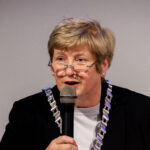
NOAC’s annual Good Practice in Local Government Seminar took place on 9 November 2021 in Kilkenny Castle, County Kilkenny. This Good Practice Seminar is organised by the National Oversight and Audit Commission (NOAC) and the Local Government Management Agency (LGMA), in partnership with the County and City Management Association (CCMA) and is an opportunity for local authorities to showcase examples of solutions-oriented approaches to providing better public services.
The case studies presented below illustrate the sector’s commitment to improving efficiency in the delivery of services to the citizen, regeneration of urban and rural areas, and measures tackling the increasing demands of the climate action and carbon agenda. The objective of the seminar is to provide local authorities with an opportunity to learn from each other and build on innovative approaches to service delivery. The case studies presented are a sample of the many equally impressive and important methods being adopted by local authorities to achieve their objectives. It is the intention of NOAC, the LGMA and the CCMA to continue to showcase good practice to build on successful initiatives and ensure that the local government sector is recognised as the most innovative public service in Ireland.

NOAC’s Good Practice in Local Government Seminar took place on 9 November 2021 in Kilkenny Castle, County Kilkenny. This Good Practice Seminar is organised by the National Oversight and Audit Commission (NOAC) and the Local Government Management Agency (LGMA), in partnership with the County and City Management Association (CCMA) and is an opportunity for local authorities to showcase examples of solutions-oriented approaches to providing better public services.
The case studies presented below illustrate the sector’s commitment to improving efficiency in the delivery of services to the citizen, regeneration of urban and rural areas, and measures tackling the increasing demands of the climate action and carbon agenda. The objective of the seminar is to provide local authorities with an opportunity to learn from each other and build on innovative approaches to service delivery. The case studies presented are a sample of the many equally impressive and important methods being adopted by local authorities to achieve their objectives. It is the intention of NOAC, the LGMA and the CCMA to continue to showcase good practice to build on successful initiatives and ensure that the local government sector is recognised as the most innovative public service in Ireland.
Good Practice in Local Government: Full Seminar
View the full seminar including contributions from the following:

Councillor Fidelis Doherty, Kilkenny County Council

Minister Peter Burke, TD, Minister of State for Planning and Local Government

Michael McCarthy, NOAC Chair

Brendan McGrath, Chief Executive Galway City Council & Chair of CCMA
Case Study Presentations
View individual presentations from the seminar below:
Weather Impact Register App (WIRE)
Presentation by David Mellett, Regional Coordinator for the Climate Action Regional Office
Mayo County Council
The local authority adaptation strategies identified the need to gather and organise data on the impacts of weather events locally in order to inform climate adaptation planning into the future. The Weather Impact Register, or WIRE App, was developed by CARO and supported by the Public Sector Innovation Fund to help meet this need. The system provides a GIS based tool to local authorities to help record and review the impacts of weather events and climate trends in their areas. An App was developed to assist in gathering weather impact information and targeted at those local authority staff that will be on the ground responding to these events as part of the emergency response teams. The dataset generated can be examined on an associated mapviewer that provides a spatial distribution of these impacts to assist in identifying areas of increasing climate risk and support evidence-based decision making and investment.
Urban Regeneration and Development Fund (URDF): A Journey through Collaboration
Presentation by Brian Barrett, Director of Services
Galway City Council
In January 2020, a second call for proposals under the Urban Regeneration and Development Fund (URDF) was opened. In response, Galway City Council engaged in a consultative dialogue with potential project partners in the City, including NUIG, GMIT, Iarnród Éireann, Bus Éireann, ESB, IDA, Galway Port Company and community organisations amongst others. From this process a number of key connected and interlinked project proposals were developed by the City Council and its partners which resulted in the City securing a successful funding allocation of €53 million under the URDF programme. This presentation outlines how through extensive collaboration, independent projects from various stakeholders were refined and woven together by Galway City Council to form a cohesive proposal for investment in compact growth in the City of Galway that will unlock and support a further €4 billion of public and private investment. This initiative will fast track the integrated sustainable growth of the City core.
Sustainable Development Goals
at Local Level
Presentation by Dara McGowan, Director of Services
Meath County Council
Meath County Council started on the Sustainable Development Goals (the Goals) journey on the fifth anniversary of the Goals on the 25th September 2020. This involved an awareness programme, linking the Goals to services, initiatives and projects undertaken by the Council and publicising this on social media. In December 2020, the Council were invited to make an application to join an URBACT project to localise the Goals, funded by the EU. The Council nominated Trim to work with 18 other locations across Europe in this pilot project. The project involves working with an URBACT Local Group (ULG) consisting of active citizens from Trim who are involved in volunteerism and community work, to feed local information and ideas into the project. The ultimate goal is to achieve an Integrated Action Plan (IAP). It is anticipated, if the project is successful, it could be replicated in other towns or scaled up to a county level.
Virtual Development Plan
Presentation by Louise McGauran, Senior Planner & Development Plan Lead
Dún Laoghaire-Rathdown County Council
The Virtual Room was an online consultation set up to allow access to a virtual consultation of the DLR Draft County Development Plan 2022 -2028. The initiative provided an opportunity for individuals and groups who could not view the plan in person due to the COVID restrictions, to view the plan in a similar layout to what would be provided in a physical display. The Virtual Room was conceived out of a desire to engage members of the community and encourage them to get involved in the plan making process. The room was the number one way in which people interacted with the Draft County Development Plan and allowed interaction across the entire County and beyond. The Virtual Room had a total of 4,280 visits, significantly more than a more traditional display would get. A total of 1,258 submissions were received on the Draft Plan, an increase of 70% from the previous Plan.
Rural Working Hubs
Presentation by Paddy Mahon, Chief Executive
Longford County Council
Remote working is becoming increasingly popular and it creates many positive opportunities for employers, employees and the communities in which they are based. Longford County Council sees the provision of remote working hubs as a key component in creating sustainable and vibrant rural communities in the County. Through the help of work completed by the Western Development Commission, Longford County Council has adopted a cross departmental approach to the development of rural working hubs, identifying the Regeneration Department as the primary contact in the development of hubs with the IT Section playing a key collaboration role also through its implementation of the County Digital Strategy. The County Digital Strategy sees Infrastructure and Connectivity as one of four key pillars placing the provision and promotion of Broadband Connection Points at the heart of creating sustainable and vibrant rural communities. Creating two strategies, implementing them together, Longford has created a platform to rejuvenate its communities.
Streetscape Development
Presentation by John Hayes, City Centre Coordinator
Cork City Council
Cork City Council made permanent changes to the City Centre and suburbs during COVID-19. Using the existing partnership structures that include transport, Gardaí, elected members and business representative organisations, Cork City Council agreed a suite of initiatives to ensure that the City Centre was adapted to meet the needs of businesses and communities in the centre during the pandemic. This was based on agreed principles such that accommodated risk taking and making mistakes. The City Council also required that interventions would be agreed by all stakeholders on the street. The Council was criticised for a short period of consultation, but this meant that possible unintended consequences were avoided. As a result 17 streets are permanently pedestrianised, 4.7km cycling routes were permanently installed and the City Centre, and suburbs, are more appealing to visit.
COVID Chatbot
Presentation by Dominic Byrne, Head of IT
Fingal County Council
Fingal County Council implemented a chatbot on the Council’s website in 2020 to provide information to citizens and businesses about the Council’s response to the COVID-19 crisis. During a time when the offices were closed to the public, the chatbot offered another information channel for the public in addition to phone, website and social media. Like the website and social media, the chatbot has the benefit of being available at a time and place of the citizen’s choosing, with the additional benefit of enabling more focussed responses. The chatbot was specifically designed to answer COVID-related questions – including questions about community support initiatives, business support initiatives, the impact of COVID on Council services, and general COVID questions. The chatbot has been a great success and it is particularly notable that citizens are now asking the chatbot questions about general Council services.
Weather Impact Register App (WIRE)
Presentation by David Mellett, Regional Coordinator for the Climate Action Regional Office
Mayo County Council
The local authority adaptation strategies identified the need to gather and organise data on the impacts of weather events locally in order to inform climate adaptation planning into the future. The Weather Impact Register, or WIRE App, was developed by CARO and supported by the Public Sector Innovation Fund to help meet this need. The system provides a GIS based tool to local authorities to help record and review the impacts of weather events and climate trends in their areas. An App was developed to assist in gathering weather impact information and targeted at those local authority staff that will be on the ground responding to these events as part of the emergency response teams. The dataset generated can be examined on an associated mapviewer that provides a spatial distribution of these impacts to assist in identifying areas of increasing climate risk and support evidence-based decision making and investment.
Urban Regeneration and Development Fund (URDF): A Journey through Collaboration
Presentation by Brian Barrett, Director of Services
Galway City Council
In January 2020, a second call for proposals under the Urban Regeneration and Development Fund (URDF) was opened. In response, Galway City Council engaged in a consultative dialogue with potential project partners in the City, including NUIG, GMIT, Iarnród Éireann, Bus Éireann, ESB, IDA, Galway Port Company and community organisations amongst others. From this process a number of key connected and interlinked project proposals were developed by the City Council and its partners which resulted in the City securing a successful funding allocation of €53 million under the URDF programme. This presentation outlines how through extensive collaboration, independent projects from various stakeholders were refined and woven together by Galway City Council to form a cohesive proposal for investment in compact growth in the City of Galway that will unlock and support a further €4 billion of public and private investment. This initiative will fast track the integrated sustainable growth of the City core.
Sustainable Development Goals
at Local Level
Presentation by Dara McGowan, Director of Services
Meath County Council
Meath County Council started on the Sustainable Development Goals (the Goals) journey on the fifth anniversary of the Goals on the 25th September 2020. This involved an awareness programme, linking the Goals to services, initiatives and projects undertaken by the Council and publicising this on social media. In December 2020, the Council were invited to make an application to join an URBACT project to localise the Goals, funded by the EU. The Council nominated Trim to work with 18 other locations across Europe in this pilot project. The project involves working with an URBACT Local Group (ULG) consisting of active citizens from Trim who are involved in volunteerism and community work, to feed local information and ideas into the project. The ultimate goal is to achieve an Integrated Action Plan (IAP). It is anticipated, if the project is successful, it could be replicated in other towns or scaled up to a county level.
Virtual Development Plan
Presentation by Louise McGauran, Senior Planner & Development Plan Lead
Dún Laoghaire-Rathdown County Council
The Virtual Room was an online consultation set up to allow access to a virtual consultation of the DLR Draft County Development Plan 2022 -2028. The initiative provided an opportunity for individuals and groups who could not view the plan in person due to the COVID restrictions, to view the plan in a similar layout to what would be provided in a physical display. The Virtual Room was conceived out of a desire to engage members of the community and encourage them to get involved in the plan making process. The room was the number one way in which people interacted with the Draft County Development Plan and allowed interaction across the entire County and beyond. The Virtual Room had a total of 4,280 visits, significantly more than a more traditional display would get. A total of 1,258 submissions were received on the Draft Plan, an increase of 70% from the previous Plan.
Rural Working Hubs
Presentation by Paddy Mahon, Chief Executive
Longford County Council
Remote working is becoming increasingly popular and it creates many positive opportunities for employers, employees and the communities in which they are based. Longford County Council sees the provision of remote working hubs as a key component in creating sustainable and vibrant rural communities in the County. Through the help of work completed by the Western Development Commission, Longford County Council has adopted a cross departmental approach to the development of rural working hubs, identifying the Regeneration Department as the primary contact in the development of hubs with the IT Section playing a key collaboration role also through its implementation of the County Digital Strategy. The County Digital Strategy sees Infrastructure and Connectivity as one of four key pillars placing the provision and promotion of Broadband Connection Points at the heart of creating sustainable and vibrant rural communities. Creating two strategies, implementing them together, Longford has created a platform to rejuvenate its communities.
Streetscape Development
Presentation by John Hayes, City Centre Coordinator
Cork City Council
Cork City Council made permanent changes to the City Centre and suburbs during COVID-19. Using the existing partnership structures that include transport, Gardaí, elected members and business representative organisations, Cork City Council agreed a suite of initiatives to ensure that the City Centre was adapted to meet the needs of businesses and communities in the centre during the pandemic. This was based on agreed principles such that accommodated risk taking and making mistakes. The City Council also required that interventions would be agreed by all stakeholders on the street. The Council was criticised for a short period of consultation, but this meant that possible unintended consequences were avoided. As a result 17 streets are permanently pedestrianised, 4.7km cycling routes were permanently installed and the City Centre, and suburbs, are more appealing to visit.
COVID Chatbot
Presentation by Dominic Byrne, Head of IT
Fingal County Council
Fingal County Council implemented a chatbot on the Council’s website in 2020 to provide information to citizens and businesses about the Council’s response to the COVID-19 crisis. During a time when the offices were closed to the public, the chatbot offered another information channel for the public in addition to phone, website and social media. Like the website and social media, the chatbot has the benefit of being available at a time and place of the citizen’s choosing, with the additional benefit of enabling more focussed responses. The chatbot was specifically designed to answer COVID-related questions – including questions about community support initiatives, business support initiatives, the impact of COVID on Council services, and general COVID questions. The chatbot has been a great success and it is particularly notable that citizens are now asking the chatbot questions about general Council services.




























